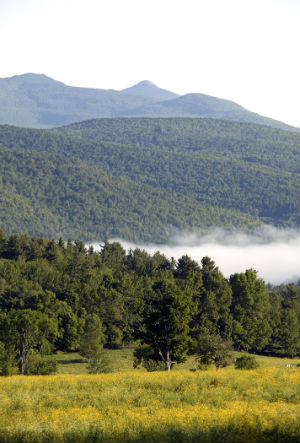slideshow - forest
Forest Health
Healthy forests are ecologically functional and resilient to disturbance. They are valued by communities and have the capacity to produce economic benefits. Forest health programs protect these functions by monitoring insects and diseases, tree condition, and other ecosystem features; providing information and technical assistance; and managing forest pests through prevention, early detection, and integrated management.
Vermont Urban & Community Forestry Program
The Vermont Urban & Community Forestry Program works collaboratively between the Department of Forests, Parks & Recreation, University of Vermont Extension, and the USDA Forest Service, State and Private Forestry. Visit our webpage at vtcommunityforestry
Overview of Vermont’s Forests
 The landscape of Vermont has experienced many changes during our history. One of the constants has been a working forest landscape that provides goods and services through forest stewardship, management, and conservation.
The landscape of Vermont has experienced many changes during our history. One of the constants has been a working forest landscape that provides goods and services through forest stewardship, management, and conservation.
Forest Ecosystems
Forest ecosystems are more than just trees. While it is true that trees are the dominant feature of a forest, their connection to and interaction with other biotic and abiotic features is what forms the forest ecosystem. Understanding what organisms live in our forests and how they interact with their environment is essential to developing different approaches in tree management and rural and urban forest protection to promote long-term forest ecosystem health.
Wood Energy
 Vermont is 74% forested and wood is your local, sustainable, renewable fuel source. The Department of Forests, Parks and Recreation supports the adoption of an “advanced wood heating” program which encourages the use of highly efficient, clean burning/low emitting technology, while recognizing that safeguarding long-term forest health is critical to ensure that wood fuel is renewable and sustainable.
Vermont is 74% forested and wood is your local, sustainable, renewable fuel source. The Department of Forests, Parks and Recreation supports the adoption of an “advanced wood heating” program which encourages the use of highly efficient, clean burning/low emitting technology, while recognizing that safeguarding long-term forest health is critical to ensure that wood fuel is renewable and sustainable.


